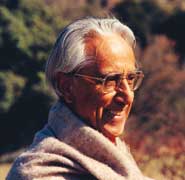




Religion (religiosity, religiology, religionism)
Religion emerges from the experience of encountering the Mystery, that later crystallizes into the distinct religions. Religion is “the link that at once transcends time and space and unites man with God”. But “to understand what religion is, we must know what the religions, religious facts, are”.
For Panikkar, religion has a triple meaning.
Religion can mean religiosity, the religious fact as fundamental human dimension. The human being is, above all, homo religiosus; religion is the most adequate category for defining man (animal religiosus)” (Religión y religiones). Religiosity is an anthological fact according to which every man, in so far as he is man, has a dimension that separates him from the animals and makes him aware of the infinite, of the unknown, of that which no word can describe, the ineffable, that something more” (Nueve apuntes para una reflexión sobre la religión). That is, religiosity, which, as a human dimension, unites us all to each other. Religious practices are the expressions of human religious feeling, crystallized in concrete manifestations of word and work, through rites and actions of all kinds.
Religiology comes later with the study of religion and the religions; it is the reflection turned on the fact of religiosity. “Since we are intellectual beings we interpret this fact and extract diverse theologies, religious systems, systems of beliefs”. As we have already seen, belief should not be confused with faith: every man has faith. Nonetheless, beliefs are the intellectual articulations of this faith, which is the birthright of all humanity.
In a third sense, religion can mean religionism, which is understood in the sense of man belonging to some group; the necessity of forming society, of feeling ourselves in community. This is a sociological reality: although, as Panikkar expresses so well, without religiosity as a human dimension, religionism is reduced to the superficial” (Nueve apuntes para una reflexión sobre la religión). Without religiosity, religionism has no roots and immediately degenerates into a superstructure or superstition.
Thus, we cannot, as has happened on more than one occasion, confuse the religions with a mere sociological fact. All three of these senses of religion are necessary, and therefore we cannot separate them. There is no religion springing from religiosity that does not express itself in a certain way and create a certain community.
official site